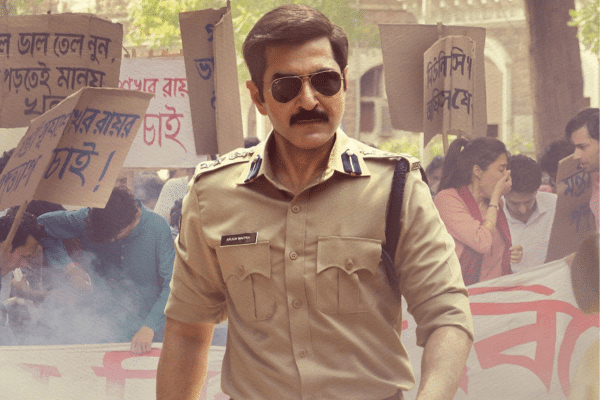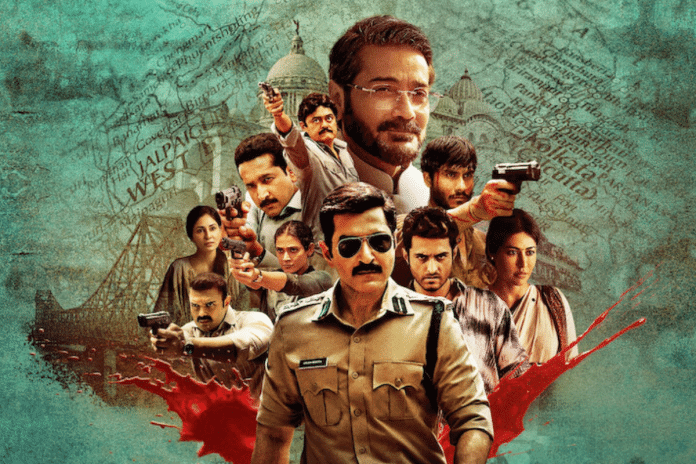When it comes to gritty Indian crime dramas, Neeraj Pandey has carved out a niche with layered narratives and morally complex characters. Khakee: The Bengal Chapter, streaming on Netflix is set in the politically charged backdrop of early 2000s West Bengal, the series delves deep into the murky corridors of power, crime, and law enforcement, offering an atmospheric—if somewhat familiar—ride through Kolkata’s underbelly shot beautifully.
At a Glance
Series: Khakee The Bengal Chapter
Creator: Neeraj Pandey
Cast: Jeet, Prosenjit Chatterjee, Ritwik Bhowmick, Aadil Zafar Khan, Parambrata Chattopadhyay, Saswata Chatterjee, Chitrangada Singh.
Rating: ★★★☆☆ (3/5)
Crime, Cops, and Calculated Moves
The series follows the rise and rule of Shankar Barua, aka Bagha (played chillingly by Saswata Chatterjee), a gangster whose influence grows hand-in-glove with the political establishment. His deep ties to the fictional political outfit, National Ganashakti Sanghathan, are a clear reference to the Communist Party of India (Marxist), or CPI(M), which ruled West Bengal for over three decades. The party’s notorious history of political patronage and violent muscle power is mirrored in how Bagha rises unchecked — protected, promoted, and occasionally punished by his political benefactors.
When Bagha’s criminal empire threatens to spiral out of control, IPS officer Saptarshi Sinha (Parambrata Chattopadhyay) is brought in to clean house. But his sudden demise triggers the arrival of a new force: IPS officer Arjun Maitra (Jeet), a principled but steely lawman determined to take Bagha and his aides down, brick by brick.
Interwoven into this conflict are Bagha’s trusted aides Sagor (Ritwik Bhowmik) and Ranjit (Aadil Zafar Khan), whose personal evolution adds texture to the larger power struggle. Meanwhile, Prosenjit Chatterjee’s Barun Roy, a shrewd political puppet master, pulls strings from behind the scenes, echoing the real-life clout of CPI(M)’s high-command style of leadership.
A Shadow of the Red Past—and the Rise of the Future
What’s particularly fascinating is how the series doesn’t just portray the twilight of the CPI(M) era, but subtly hints at the political vacuum it created — and how a new power was waiting in the wings. The character of Nibedita Bashak (played by Chitrangada Singh), a firebrand female leader who challenges the patriarchal political order, draws clear inspiration from current West Bengal CM Mamata Banerjee.
While not named directly, the parallels are hard to miss. Her populist tone, street-level activism, and refusal to be cowed by legacy parties mark a turning point in the story — much like Banerjee’s emergence as a game-changer in Bengal’s real-life political history. But power, no matter who wields it, often borrows the same violent playbook.
In its final episodes, Khakee: The Bengal Chapter seems to say that Bengal’s politics may have changed its face, but not its fists. The baton of violence has simply passed from one party to another — from red flags to blue ones. The cycle continues, cloaked in new slogans but driven by the same machinery of fear, intimidation, and transactional alliances with criminal elements.
Morality, Power, and Consequence
At its core, Khakee: The Bengal Chapter is less about crime and more about how systems enable it. It’s a commentary on the blurred lines between justice and vendetta, loyalty and fear, power and responsibility. Arjun Maitra’s struggle isn’t just with Bagha, but with an ecosystem that rewards silence and punishes integrity.

Bengali star Jeet is impeccable as Arjun Maitra, making a powerful Hindi debut that was well worth the wait. With over two decades of experience in Bengali cinema, Jeet brings gravitas and restraint to the role, commanding the screen with quiet intensity. Matching him in presence is Ritwik Bhowmik as Sagor, whose portrayal of a menacing, morally conflicted character leaves a lasting impact.
Sagor and Ranjit’s arc, too, is not just one of ascent and destruction—it’s a cautionary tale about ambition unchecked by empathy. The show touches upon the cost of violence—not just in body counts, but in eroded ideals and broken communities.
By embedding its narrative in Bengal’s political past and present, the series raises uncomfortable but timely questions: Has anything really changed? Or are we simply watching the same theatre with different actors?
Khakee: The Bengal Chapter doesn’t revolutionise the Indian crime drama space, but it comfortably holds its place within it. With atmospheric storytelling, powerful performances, and a brooding portrait of power and decay, it makes for a compelling watch—even if it occasionally stumbles (it could have easily been cut short by a couple of episodes).
More importantly, it offers a stark mirror to Bengal’s political legacy — from the entrenched violence of CPI(M)’s rule to the assertive, often aggressive, politics of Mamata Banerjee’s Trinamool Congress. Both, the series seems to argue, are part of the same legacy of control through coercion.
For fans of the genre, it’s worth the binge. For others, it’s a reminder of how, in Bengal at least, the Khakee uniform remains both protector and pawn.
Read more: Review: Vidaamuyarchi






